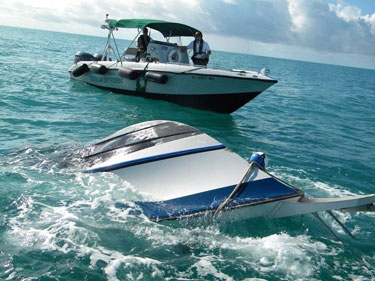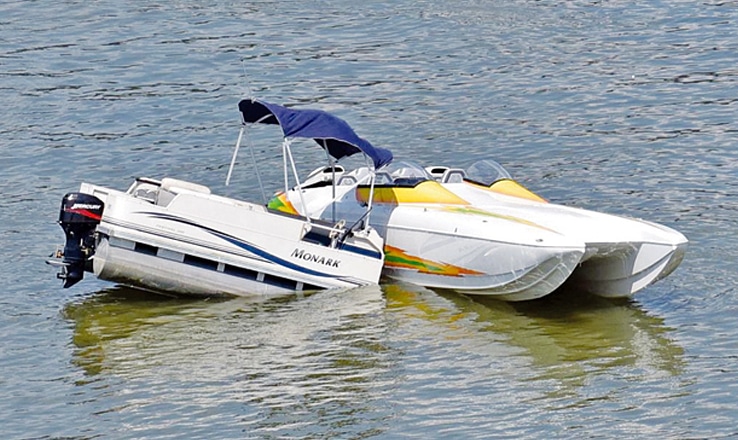
Tips for Safe Boating on July 4 from a St. Lucie Maritime Attorney
It’s been a scorcher these past weeks, and with the July 4th holiday coming up, boaters in Fort Pierce, Port St. Lucie, Stuart, and Vero Beach are going to hit the water to cool off and have a good time with their families on a boat. We’ve featured information about boating accidents on our website in the past and while nobody ever thinks they will have a horrific day on the water, anything can happen at sea! Just last week an experienced Port St. Lucie boater had his recently purchased boat sink out from underneath everyone onboard “like a rock.” Luckily a good Samaritan rescued the anglers and he was able to send out a “mayday” over his VHF radio before the sinking. The swift actions likely prevented further injury from this maritime accident.
The gentlemen from Port St. Lucie responded quickly once he knew there was trouble and first had everyone put on their life jackets and in our opinion this is the absolute key move that a boater should make at the sign of any trouble: have all passengers put on their life jackets. You never know how a boat accident will play out and whether or not you may end up overboard. But, if you do end up in the water you want to have a life jacket on to increase your chances for survival and to decrease the possibility of serious personal injury.
Of course, in order to don your lifejackets, you’ve got to have them onboard in the first place. As a boat or yacht operator, you are expected to make sure that your vessel carries the required safety equipment. Here is our list of some boating tips which may help boaters or yachtsmen avoid or minimize the injuries and damages from boat accidents this July 4th:

- Carry life jackets (PFD’s) onboard as required by law: All recreational boats have to carry one wearable life jacket for each person onboard. If your boat is more than 16 feet you must also carry a throwable device. In Florida waters, children under 6 must wear a U S Coast Guard approved life jacket anytime a vessel is underway.
- Carry a Fire Extinguisher: Fires do occur on boats. This is why the US Coast Guard mandates that vessels less than 26 feet carry 1 type B fire extinguisher. Vessels between 26 feet and 40 feet must have either 2 type B-I or 1 type B-II fire extinguishers unless they have a an approved fixed system and vessels between 40 feet to 65 feet must have either 3 type B-I or 1 type B-II and type1 B-I, unless they have an approved fixed system.
- Don’t Operate a vessel while under the Influence of Alcohol or Drugs (Boating under the Influence (BUI): Around 25% of the, time alcohol or drug use is a contributing factor in boating accidents. It is a violation of Florida law to operate a vessel while impaired by alcohol or drugs.
- Know how to operate the VHF radio, monitor Channel 16, and be able to give proper distress Calls: Being able to get out a proper distress call when a boating accident or injury occurs can make the difference between the Coast Guard or another vessel being able to find and rescue you and being completely “on your own” after a maritime casualty.
-
- “Maydays” are first priority distress calls used when there is imminent danger of loss of life or vessel
- “Pan-Pan” (pahn-pahn) distress calls are the next highest priority used when there is danger to a vessel or a person in sight or onboard
- “Securite” (see-cure-i-tay) are third priority safety messages to notify mariners of items relating to navigational safety or weather.
- How to make a mayday call:
-
- Find and press the DISTRESS button on your VHF until the radio beeps
- Clearly and forcefully state: “Mayday, Mayday, Mayday. This is vessel [your boats name or description*] *repeat this three times
- Then say “Mayday. The vessel [“your boats name or description”] is located at [current position, speed and bearing].
- Say again “Mayday. The vessel [“your boats name or description”] has [#] people on board. [You can advise here of injuries, intent to abandon your vessel or deploy lifeboats, etc]
- Say “This is [“your boats name or description”], [callsign/MMSI]. Over.”
- Let go of the “Talk “ button and wait for a response
- If you have no response after 15 seconds repeat the call again
- If there still isn’t a reply and you don’t have to leave your boat, try another channel and break in with your distress call. Ask other vessels to transmit your distress call to shore.
-
-
- Have a pre sailing Checklist and follow it: It is always recommended that you do a vessel check before departing to make sure your boat or yacht is ready for the sea. It is good to create a written checklist that you follow that is specific to your boat. Some of the items you may wish to include on your checklist could be:
-
- “Sniff” test (gasoline engines)
- Run blowers for 4 minutes
- PFD’s one for each person
- Throwable flotation device
- Fire extinguishers
- Flares, horn, whistle, bell (if required)
- Check running lights (side, stern and mast light)
- Bilge and bilge pumps (check float switch)
- Fenders, boat hook and traveling dock lines
- First Aid Kit
- Radio Check
- Bucket and sponge
- Check fuel system integrity
- Check deck scuppers / Kingston valves
-
If you become involved in a serious boat accident you should contact an attorney with experience in maritime matters and marine insurance. The Law Office of Todd C. Passman handles maritime casualty and other cases involving marine insurance in Florida.
Tell us about your problem. We can help.
If you have become involved in a boating accident or have a claim involving marine insurance, or have questions please call attorney Todd C. Passman today, at (772) 465-9806 or or fill out the contact form. Someone from our office will contact you right away.